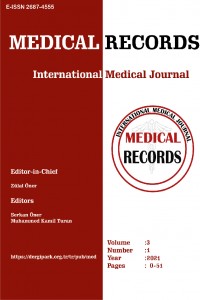Öz
Bilişsel yapıda yer alan işlevsiz inançlar bireyin düşüncesini biçimler ve psikopatolojiye özgü bilişsel hatalara yol açarlar. Bu bilişsel hataları değerlendirmek amacıyla çeşitli ölçekler geliştirilmiştir. Son dekatta geliştirilen ve Türkçe’ye adapte edilen Düşünce Özellikleri Ölçeği (DÖÖ) ise bilişsel hataları tek bir ölçek vasıtasıyla hem kişilerarası ilişkiler açısından hem de bireysel başarı açısından ayrı ayrı değerlendirmemizi sağlayan bir psikometrik araçtır. Araştırmalardaki kullanımı giderek artmaktadır. Bu çalışmada DÖÖ kullanılarak gerçekleştirilmiş psikiyatrik araştırmaları özetlemeyi amaçladık.
Anahtar Kelimeler
Biliş Bilişsel Hata Düşünce Özellikleri Ölçeği Psikiyatrik Bozukluk
Kaynakça
- 1. Dozois DJA, Beck AT. Cognitive schemas, beliefs and assumptions. In: Dobson KS, Dozois DJA, eds. Risk Factors in Depression. Oxford, England: Elsevier/Academic Press, 2008. p. 121-43.
- 2. Shah R, Waller G. Parental style and vulnerability to depression: the role of core beliefs. J Nerv Ment Dis. 2000; 188(1): 19-25.
- 3. Baytemir K. Perfectionism, irrational beliefs, need for social approval and gender as predictors of parent exam anxiety. Bartın Üniversitesi Eğitim Fakültesi Dergisi. 2019; 8(1): 161-78.
- 4. Wong SS. The relations of cognitive triad, dysfunctional attitudes, automatic thoughts, and ırrational beliefs with test anxiety. Current Psychology. 2008; 27: 177-191.
- 5. Özdel K, Taymur I, Guriz SO, Tulaci RG, Kuru E, Turkcapar MH. Measuring cognitive errors using the cognitive distortions scale (CDS): Psychometric properties in clinical and non-clinical samples. PLoS ONE 2014; 9(8):e105956.
- 6. Beck AT, Rush A, Shaw B, Emery G. Cognitive therapy of depression. New York: Guilford, 1979.
- 7. Burns DD. Feeling good: The new mood therapy. New York: Signet, 1980.
- 8. Covin R, Dozois DJA, Ogniewicz A, Seeds PM. Measuring cognitive errors: Initial development of the Cognitive Distortions Scale (CDS). Int J Cogn Ther. 2011; 4: 297-322.
- 9. Örüm MH, Kara MZ, Kuştepe A, Kalenderoğlu A. Bilişsel hatalar ve dikkat-eksikliği hiperaktivite bozukluğu belirtilerinin madde kullanım özellikleri ile ilişkisi. Bağımlılık Dergisi. 2019; 20(2): 47-60.
- 10. Orum MH. Investigation of the relationship between cannabis use, opioid use and cognitive errors. Medicine Science. 2020; 9(2): 362-9.
- 11. Örüm MH. The relationship between cognitive errors and psychiatric symptoms in obsessive-compulsive disorder. Med J Ankara Tr Res Hosp. 2020; 53(1): 29-35.
- 12. Örüm MH. Cognitive error characteristics of rumination and cleaning dimensions of obsessive-compulsive disorder. Anadolu Psikiyatri Derg. 2020; 21(6): 592-9.
Öz
Dysfunctional beliefs in the cognitive structure shape the individual's thinking and lead to cognitive errors specific to psychopathology. Various scales have been developed to evaluate these cognitive errors. The Cognitive Distortions Scale (CDS), which was developed in the last decade and adapted to Turkish, is a psychometric tool that allows us to evaluate cognitive errors separately in terms of interpersonal relationships and personal achievement through a single scale. Its use in research is increasing. In this study, we aimed to summarize psychiatric studies using CDS.
Anahtar Kelimeler
Cognition Cognitive Error Cognitive Distortions Scale Psychiatric Disorder
Kaynakça
- 1. Dozois DJA, Beck AT. Cognitive schemas, beliefs and assumptions. In: Dobson KS, Dozois DJA, eds. Risk Factors in Depression. Oxford, England: Elsevier/Academic Press, 2008. p. 121-43.
- 2. Shah R, Waller G. Parental style and vulnerability to depression: the role of core beliefs. J Nerv Ment Dis. 2000; 188(1): 19-25.
- 3. Baytemir K. Perfectionism, irrational beliefs, need for social approval and gender as predictors of parent exam anxiety. Bartın Üniversitesi Eğitim Fakültesi Dergisi. 2019; 8(1): 161-78.
- 4. Wong SS. The relations of cognitive triad, dysfunctional attitudes, automatic thoughts, and ırrational beliefs with test anxiety. Current Psychology. 2008; 27: 177-191.
- 5. Özdel K, Taymur I, Guriz SO, Tulaci RG, Kuru E, Turkcapar MH. Measuring cognitive errors using the cognitive distortions scale (CDS): Psychometric properties in clinical and non-clinical samples. PLoS ONE 2014; 9(8):e105956.
- 6. Beck AT, Rush A, Shaw B, Emery G. Cognitive therapy of depression. New York: Guilford, 1979.
- 7. Burns DD. Feeling good: The new mood therapy. New York: Signet, 1980.
- 8. Covin R, Dozois DJA, Ogniewicz A, Seeds PM. Measuring cognitive errors: Initial development of the Cognitive Distortions Scale (CDS). Int J Cogn Ther. 2011; 4: 297-322.
- 9. Örüm MH, Kara MZ, Kuştepe A, Kalenderoğlu A. Bilişsel hatalar ve dikkat-eksikliği hiperaktivite bozukluğu belirtilerinin madde kullanım özellikleri ile ilişkisi. Bağımlılık Dergisi. 2019; 20(2): 47-60.
- 10. Orum MH. Investigation of the relationship between cannabis use, opioid use and cognitive errors. Medicine Science. 2020; 9(2): 362-9.
- 11. Örüm MH. The relationship between cognitive errors and psychiatric symptoms in obsessive-compulsive disorder. Med J Ankara Tr Res Hosp. 2020; 53(1): 29-35.
- 12. Örüm MH. Cognitive error characteristics of rumination and cleaning dimensions of obsessive-compulsive disorder. Anadolu Psikiyatri Derg. 2020; 21(6): 592-9.
Ayrıntılar
| Birincil Dil | İngilizce |
|---|---|
| Konular | Klinik Tıp Bilimleri |
| Bölüm | Editöre Mektup |
| Yazarlar | |
| Yayımlanma Tarihi | 23 Ocak 2021 |
| Kabul Tarihi | 30 Aralık 2020 |
| Yayımlandığı Sayı | Yıl 2021 Cilt: 3 Sayı: 1 |
Chief Editors
Assoc. Prof. Zülal Öner
Address: İzmir Bakırçay University, Department of Anatomy, İzmir, Turkey
Assoc. Prof. Deniz Şenol
Address: Düzce University, Department of Anatomy, Düzce, Turkey
Editors
Assoc. Prof. Serkan Öner
İzmir Bakırçay University, Department of Radiology, İzmir, Türkiye
E-mail: medrecsjournal@gmail.com
Publisher:
Medical Records Association (Tıbbi Kayıtlar Derneği)
Address: Orhangazi Neighborhood, 440th Street,
Green Life Complex, Block B, Floor 3, No. 69
Düzce, Türkiye
Web: www.tibbikayitlar.org.tr
Publication Support:
Effect Publishing & Agency
Phone: + 90 (553) 610 67 80
E-mail: info@effectpublishing.com
Şehit Kubilay Neighborhood, 1690 Street,
No:13/22, Keçiören/Ankara, Türkiye
web: www.effectpublishing.com


